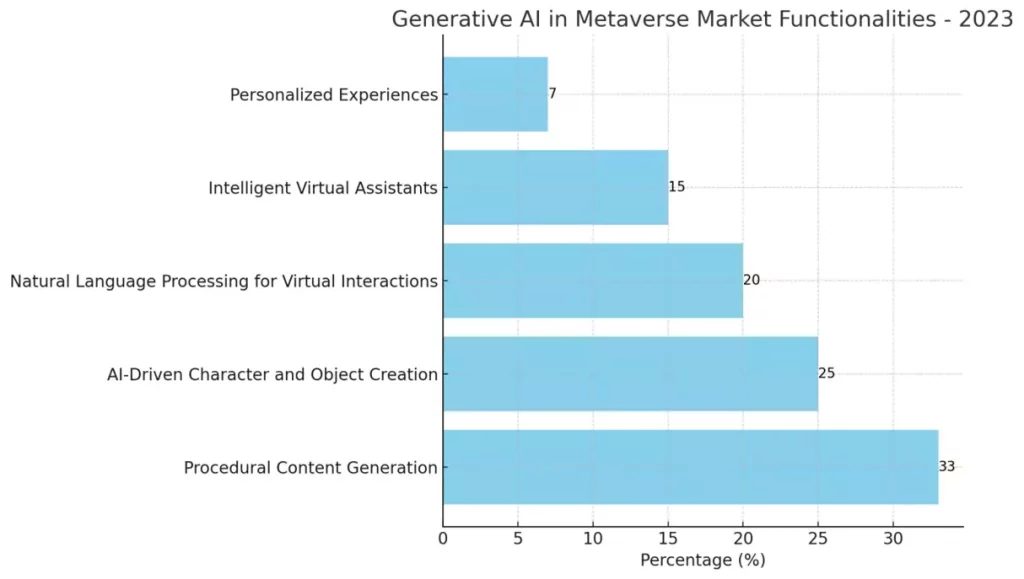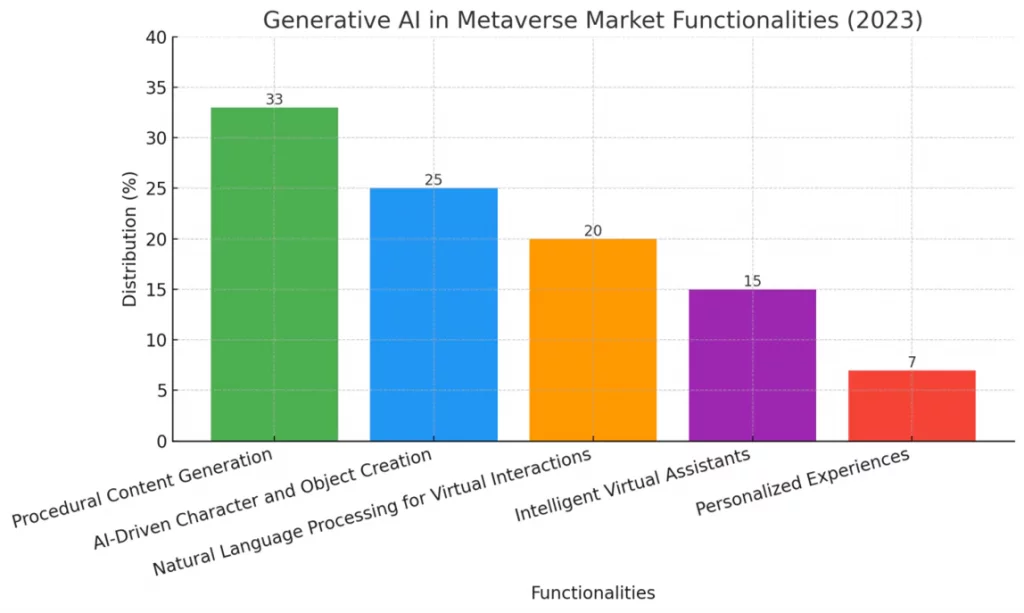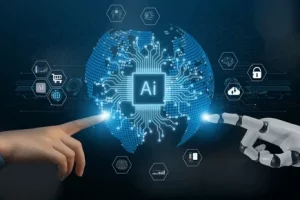
What is the Role of AI in the Metaverse?
- Posted by 3.0 University
- Categories Artificial Intelligence, Metaverse
- Date March 28, 2025
- Comments 0 comment
Introducing Artificial Intelligence and the Metaverse
Digital spaces keep morphing, and with every shift, the mix of AI and the metaverse opens up a bunch of new opportunities—and a few challenges too. Smart systems these days do more than just give you a tailored interaction; they also build immersive worlds that change on the fly with your every move.
You can say that AI is pretty much the main driver here, powering real-looking avatars and smooth interfaces that tend to pull people back into these virtual zones.
In most cases, AI’s knack for crunching data in real time lets platforms tweak and fine-tune what you see based on how you act, often making last-minute changes as needed.
Occasionally, you catch a hint of all this in visuals, like the one depicted in, where a character casually interacts with digital elements in a high-tech setting.
All in all, these snapshots really capture how AI reshapes not only the look of these digital realms but also the way they function, serving as a key spark for fresh, innovative connections online.
In this piece Let’s learn how AI is used in the metaverse!
Enhancing User Experience through AI in the Metaverse
AI in the metaverse isn’t just a small upgrade—it’s a bold leap into entirely new, immersive digital realms. Intelligent algorithms operate in the background, adapting these virtual environments to suit individual preferences, often creating journeys that feel surprisingly intimate.
That knack for tailoring experiences is key; in most cases it fires up engagement and leaves users feeling more connected.
Then, as AI keeps getting smarter (generally speaking), we now see avatars that reflect not only our physical looks but even our moods, throwing a fresh spin on social interactions.
As some have pointed out, blending customized environments with real-time interactions shows just how much AI is reshaping user engagement.
And finally, smart virtual assistants help smooth out navigation and wrap up tasks, ensuring everyone’s journey remains not just interactive but also a bit intuitive, which ultimately cements AI’s vital role in enhancing metaverse experiences.

This chart illustrates the distribution of functionalities within the Generative AI in Metaverse Market in 2023, highlighting the significant role of AI in enhancing user experiences through personalized and immersive virtual environments.
AI-Driven Content Creation and Personalization in Virtual Environments
Digital spaces are shifting fast, and AI is now deeply wedded to these virtual realms in ways that entirely change how we connect and customize our experiences.
Rather than simply auto-making environments and storylines, smart systems now tune things up based on what a person might enjoy, which—as it often does—boosts how engaged we feel.
Take a look at how some clever algorithms quietly monitor what you do and then put together content that feels personal, pretty much making every journey through the metaverse seem uniquely yours.
That kind of tailored setup really ups the immersive vibe of digital spaces, creating a sense of belonging and a kind of connectedness that isn’t always expected.
Most of the time, the real-time modifications of virtual content demonstrate that AI is not merely automating tasks, but also plays a crucial role in creating dynamic narratives and environments.
All in all, these advancements show, generally speaking, that AI plays a pivotal role in evolving the metaverse—allowing users to dig deeper into interactive, richly designed digital worlds
Here’s a brief depiction of the Role of AI in metaverse.

This bar chart demonstrates the intricacies of distribution of functionalities within the Generative AI in the Metaverse Market in 2023.
The emphasis is on the significant role of AI in enhancing user experiences through personalized and immersive virtual environments, with Procedural Content Generation leading at 33%, followed by AI-Driven Character and Object Creation at 25%, Natural Language Processing for Virtual Interactions at 20%, Intelligent Virtual Assistants at 15%, and Personalized Experiences at 7%.
Ethical Considerations and Challenges of AI in the Metaverse
The metaverse’s shifts and the integration of AI into our digital spaces seem to multiply ethical challenges.
One big worry is that biased algorithms might not only echo but even deepen long-standing inequalities—mostly because these systems learn from huge data pools that still carry old prejudices.
It’s curious how something designed to help can end up reinforcing the very issues we’re trying to fix.
Secondly, AI-powered avatars can sometimes confuse the decision-making process by blurring the distinction between user decisions and algorithmic nudges.
Data privacy, too, takes on extra weight when people dive into virtual realms where sensitive details can sneakily get picked up.
There’s an image out there showing AI’s assorted roles in shaping avatars and guiding interactions, a clear hint that these ethical matters shouldn’t be left on the back burner.
In most cases, as AI continues to carve out its niche in the metaverse, everyone involved—be it developers, users, or other stakeholders—needs to back frameworks that are fair, transparent, and truly empower users, even if the whole picture sometimes ends up a bit messy.
Ethical Issue | Description |
Data Privacy and Security | Ensuring the protection of personal data within the metaverse is crucial, as the digitization of the physical world increases the risk of data breaches and unauthorized access. Implementing robust security measures, such as blockchain technology, can enhance data integrity and user trust. ([ncbi.nlm.nih.gov] (https://ncbi.nlm.nih.gov/pmc/articles/PMC9862285/?utm_source=openai)) |
Explainability and Transparency | AI systems in the metaverse must be designed to provide clear and understandable explanations for their decisions and actions. This transparency is essential for building trust and accountability among users. ([dataviz.unesco.org] (https://dataviz.unesco.org/en/legal-affairs/recommendation-ethics-artificial-intelligence?utm_source=openai)) |
Bias and Fairness | AI algorithms can inadvertently perpetuate existing biases, leading to unfair treatment of certain user groups. Continuous monitoring and adjustment of AI systems are necessary to mitigate bias and promote fairness. ([unesco.org] (https://www.unesco.org/en/legal-affairs/recommendation-ethics-artificial-intelligence?utm_source=openai)) |
Accountability and Responsibility | Determining who is responsible for the actions and decisions made by AI systems in the metaverse is complex. Clear frameworks are needed to assign accountability and ensure ethical compliance. ([hhs.gov] (https://www.hhs.gov/ohrp/sachrp-committee/recommendations/irb-considerations-use-artificial-intelligence-human-subjects-research/index.html?utm_source=openai)) |
Ethical Considerations of AI in the Metaverse
Conclusion
The merging of artificial intelligence and the metaverse is significantly transforming our digital landscape.
AI now perfects avatar creation, pulls you into immersive virtual spaces, and—often—even overcomes language gaps, making these platforms feel more open and connected.
Every interaction seems to feedback insights that, frankly, lead to constant tweaks and a bit of extra personalization, deepening how we engage with them.
This mix of tech and human behaviour shows, obviously, that blending AI into these realms is pretty key for their long-term growth and sustainability.
A visual display highlighted in the image, for example, captures AI’s many roles—not just as a basic tool but as a spark for creative innovation.
Ultimately, AI’s part goes beyond mere functionality; it’s essential in crafting a metaverse experience that’s smooth, inclusive, and even a bit magical.
All in all, this synergy might just transform how digital interactions, and social connections shape up in the future.
Empower your career with 3.0 University next-gen online courses in Web3 technologies. Explore the AI-Powered Ethical Hacking Program, dive into advanced cybersecurity, and master Blockchain and AI innovations—all with global certifications.
You may also like

AI-Driven Cyber Threats

AI Education and Job Market in 2025

